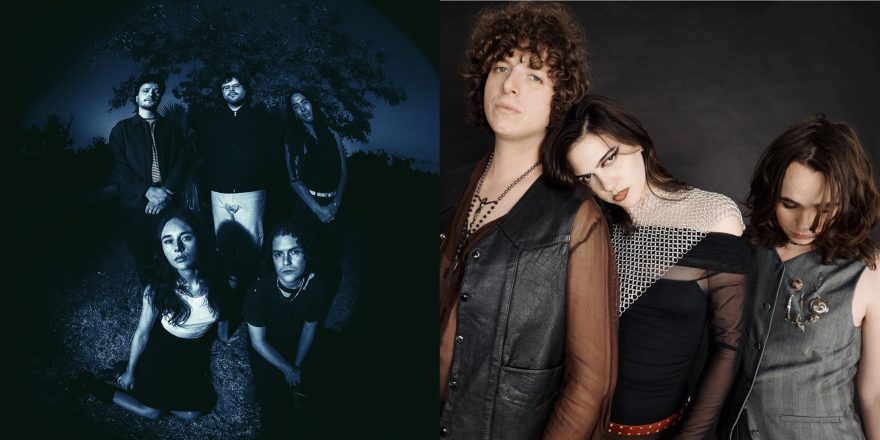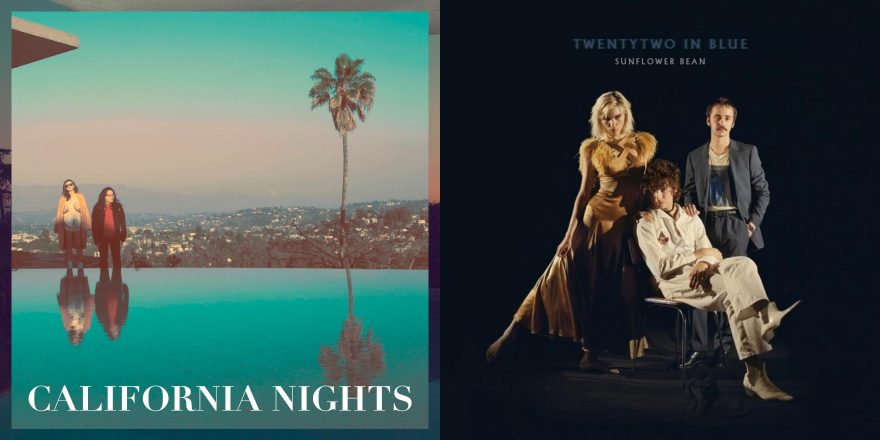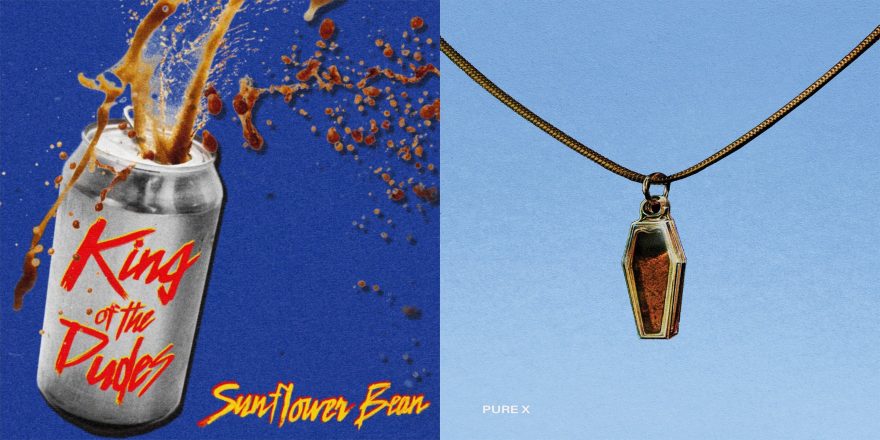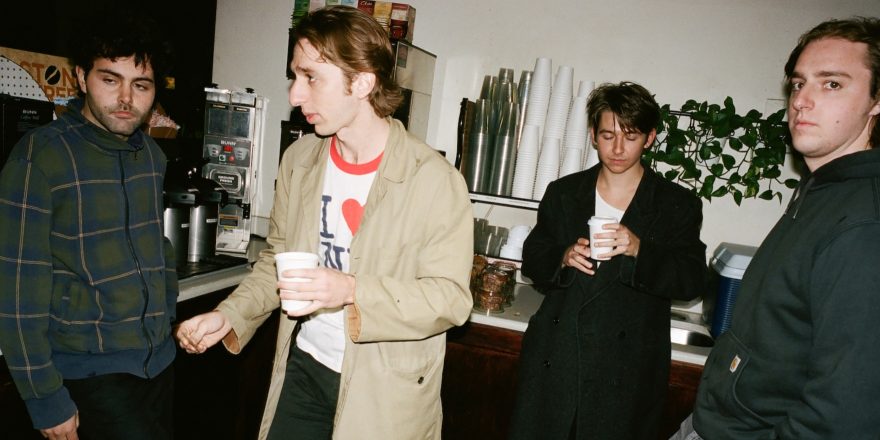Julia Cumming and Nick Kivlen are two-thirds of the NYC band Sunflower Bean; TJ Freda is one-fifth of the NYC band GIFT, the guitarist and singer. Sunflower Bean’s latest record, Mortal Primetime, came out this past April and to celebrate, Julia and Nick sat down with TJ while their bands were on tour together to chat about it, and much more.
— Annie Fell, Editor-in-chief, Talkhouse Music
Julia Cumming: Hit record, brother… Where are we right now, TJ?
TJ Freda: We’re in Madison, Wisconsin, in a hotel room on the last night before Chicago for our tour together.
Julia: Yeah, it’s almost the end. It’s really sad.
TJ: It’s really sad. It’s been a great tour. It’s been some trials and tribulations. AC is broken.
Julia: You guys almost fried up a bunch of over-easy eggs in that van when the tour started. I mean, it wasn’t the heat of summer yet, but it was getting there. You guys really tried to hold it down for a while. And you really had a really good attitude about it — better attitude than we would have had, for sure.
TJ: [Laughs.] Road warriors… I listened to your entire discography on the drive here, from start to finish.
Julia: What’s your main takeaway from that experience?
TJ: It’s definitely a journey.
Julia: [Laughs.] Not a compliment, not an insult.
TJ: [Laughs.] No, it’s a journey of, I feel like I hear you all growing up through music. It’s pretty crazy. And I’ve only known y’all for the last two years, I guess. But I’ve been a fan since I saw you guys in 2016 with the Lemon Twigs at Brighton Music Hall in Boston. And I remember when Show Me Your Seven Secrets came out on Bandcamp and I was served it.
Julia: That’s really cool.
TJ: You know, life happens and you go in and out, but for the most part, I’ve been aware of every album that’s come out. And it was interesting, listening today — it’s 10 years’ worth of music.
Julia: Yeah. Was there anything that was better or worse than you remembered, or had never heard before?
TJ: No. I mean, I know Show Me Your Seven Secrets to Human Ceremony like the back of my hand, because that was in a time when you guys were roped in with the iconic New York music scene, and I was just a neighbor to that in Boston, so I was hyper-focused on everything that was happening in New York. I feel like a a historian for 2015 New York music.
Nick Kivlen: That’s so funny.
Julia: But then you dropped off — Twentytwo In Blue was probably too soft.
TJ: [Laughs.] Not necessarily. Because that came out 2017, 2018? So I was moving to New York at that time, and then I was touring a lot. GIFT had not started yet, but I was in a band called GYMSHORTS, touring the country with no AC in the car. Shout out Sarah [Greenwell]. I went through a dark period of not listening to anything, because I was kind of getting my own voice together, from 2018 to when I started GIFT in 2021.
Julia: Yeah, that happens. I think that’s sometimes what you have to do for the mental health.
TJ: Totally. Speaking of the early stuff, I’m curious the way inspirations come into play with the band. Because Nick was mentioning that he doesn’t think inspirations drive music writing for you guys, but hearing Human Ceremony to Twentytwo, there’s a big stylistic difference. And on each album, hearing it today, there’s a throughline of you guys as core songwriters. The production and the style shifts a little bit, but your songwriter voices have stayed consistent through the whole time, and the album qualities have stayed consistent.
Julia: The early stuff, like the first EP into the first album, I think we were very inspired by the DIY culture that we were a part of. So maybe rather than particular albums, it was our friends and it was also New York and the venues, and I think we were trying to lean into what made us stand out. And that continued to inspire us. Nick and Olive [Faber] were part of this band called Turnip King, and I was a part of a band called Supercute! — which was more like a performance art project done by children. [Laughs.] But I knew a lot about bands, and I knew how much I wanted to be in bands, but I wasn’t that great of a musician. I had a lot of hopes to be. But being welcomed by Nick and Olive, and them helping me develop that by us just rehearsing all the time… It’s kind of like those rehearsals became their own form of inspiration. It was like a self-inspiration loop. And me also finally feeling confident on an instrument, which was something I always wanted and I wasn’t able to do as a New York City kid not able to make sound anywhere — that kind of that led into the sound. Don’t you think, Nick?
Nick: Yeah. I think what you’re referring to when we were talking about songwriting — did I say something like, I think the way for me as a musician and artist to push forward and create something new is through lyrics and melody rather than production?
TJ: Yeah. And more like references, in terms of being like, “Yeah, we’re gonna take the drums from this” — like creating a mood board of music, versus being inspired by melody and lyrics. It’s more true to your voice versus the way the song is being presented.
Nick: Yeah. I definitely feel that way now that I’m older. I feel like in terms of genre and style and production… I’m not going to be the person right now who wants to reinvent the wheel and create the next genre. I think that the real way that I can contribute and expand the canon of music or push things forward is through lyrics and melody, and that’s what I’ve been trying to lean into recently. But it’s funny because the earlier records, especially Show Me Your Seven Secrets and Human Ceremony, we were so young and we were such sponges at that time. Around 18, 19, lyrics and melody is what I really struggled with, and the thing that I couldn’t quite grasp. But what we could do was go see a band, and then immediately the next day write a song inspired by that band. So almost one for one, I can listen to those songs and remember exactly what inspired it. It would be like, “Oh, we saw Thee Oh Sees last night, so we wrote this song.” We saw Connan Mockasin and then we wrote “Bread.” “Rock & Roll Heathen” was inspired by seeing King Gizzard for the first time. And obviously DIIV was a huge influence on the band early on. And that was really funny because Cole [Smith] took us on our first tour, and so much of our set was inspired by seeing DIIV a hundred times. He was so cool because he just encouraged us and… he wasn’t angry. [Laughs.]
Julia: I have a question for TJ. I’ve seen a lot of GIFT sets now, thankfully, with us being on tour together, and I know you better now. I know how big the Grateful Dead are for you, and [you’ve mentioned] listening to Neu! when you were getting ready for the creation of GIFT material. Coming out of GYMSHORTS, was it a decision that the stuff you were going to do in this era of your life was going to be jammier? Because I would say Neu! and Grateful Dead are jammy, in obviously very different ways, but still kind of that live psychedelic experience on two different parts of the spectrum.
TJ: It’s funny because we’re talking about being reactive to the stuff around you, being like a sponge, and at the time you guys were starting in the era of the big Captured Tracks push. And then when I came to New York, it was kind of post-that. So I think everyone was sick of indie rock with clean guitars and reverb, and everyone was doing short punk songs.
Nick: That was the Parquet Courts era.
TJ: [Laughs.] Yeah, yeah. Which, now I love Parquet Courts, but at the time I really was not into that kind of short post-punk and garage stuff. GIFT started as completely a reactive band to all of our peers at the time, because everyone was in a punk band, and it was frustrating because these punk bands weren’t really punk bands. It was kind of like yelling garage rock. So we were like, “What if we made songs that were 10 minutes long and really jammy, just to annoy everyone?” But also, we wanted to jam and learn how to play with each other, because I assembled the band of musicians from other bands. GIFT kind of started as an, in quotes, “supergroup” — a supergroup of bands no one had ever heard of. I used to love watching Kallan [Campbell] play bass in Max Pain and the Groovies, and then Justin [Hrabovsky] used to rip a 12-string guitar with a slide and a bunch of fuzz in a bunch of bands in Asheville. And Gabe [Camarano] was my favorite drummer I’d ever seen, and I’d probably asked him three times to be in different bands of mine throughout the years, and it kind of synced up. He moved to New York and I was like, “Alright, let’s do this.” In the early days, no one was really doing what we were doing. Not like we were reinventing the wheel, but in terms of the immediate New York scene.
Julia: Well, it’s something that I think we have in common, which is being comfortable standing out in a way that is very personally authentic without being part of the times. Which is kind of an annoying characteristic to have. But it is one that we share. New York is not a jam band city, and New York is also not a guitar solo city. And I think that is something that we’ve probably both experienced the highs and lows of.
TJ: Yeah. But when I first heard y’all come on to the scene, watching it from afar, it was interesting because you guys had a lot more focus on songs than a lot of the bands. You guys really stood out, because in the era of Vans and ripped jeans and pizza punks, y’all had stage outfits and looked really cool. You were like vampire goths playing guitar solos. And then when Twentytwo came out, I was like, This is amazing. Because it was almost like you were elevating yourselves out of New York onto a global scale. Y’all really pushed it, and I think continually pushed it up to this new album, too. You’ve reinvented yourselves every time. This new one’s kind of like a celebration of how far you guys have come as songwriters with lyrics and melody. It definitely feels like that.
Julia: Thanks for listening, TJ. Yeah, Mortal Primetime feels like an arrival. And, you know, you can’t ever change how people feel about you. And we certainly can’t change our ages and the placement of where we were coming up and how we did it — it inevitably creates that growing up thing. Which I think is tough because each time you’re putting it out, it’s not like you’re trying to show the world how you’re growing up. You’re trying to make a fucking album that people like. So I think this album, for me, really feels like the first time I feel able to shed that part of the identity.
Nick: I think that all four of them are pretty similar in a lot of ways. I mean, we’re undisciplined in our reach and it’s always been a factor in the band. From the very first day of our existence, people would be like, “Are you a psych rock band, or do you wanna write indie folk songs, or do you wanna make metal or do you wanna make garage rock?”
Julia: But I noticed that in the Rolling Stone interview with you guys, as well, I would say first third of the article is about people struggling to define you and you guys saying, “Psych and rock & roll.” Everyone’s trying to put you in a box and nobody’s trying to vibe out.
TJ: Yeah. It’s funny because it feels like originality these days gets punished by critics. And I’m not saying that as if we’re being punished and we’re the most original band, but there’s clear genres happening, and one genre happening right now that’s really big is shoegaze and slowcore — which used to not be lumped together, used to be mutually exclusive.
Nick: They had nothing to do with each other.
TJ: And now they’ve been lumped together. And a lot of that is rooted in emo, but the true shoegaze that defined the genre, like Cocteau Twins, was euphoric wall of sound, which is what we resonate with a lot more. So it’s difficult when writers try to be like, “You’re a psych band,” because also a psych band to me right now is like the Osees, or King Gizzard’s kind of carved their own path. I think we’re a little bit more song-y than some of the Osees stuff. They’re amazing, but you’re listening for the energy.
Julia:The theme that’s coming to me from this conversation, and if I were to be titling this — ahem, Talkhouse — I would call it, “GIFT and Sunflower Bean and the Reclaiming of the Word ‘Psych.’” Because I personally don’t think it’s a dirty word. I think it’s an awesome word. “Psychedelic” is a pretty broad word that can be used for a range of experiences. I think if you go to a show and you let the show happen to you, or you put on a record and you let the record happen to you and you’re actually open to it, I feel like the word “psychedelic” is pretty connected to the idea of being open to a musical experience. And I feel like if I had to pick an umbrella, I that’s an umbrella I like. That’s what we always called Headful [of Sugar] as well, because I feel like Headful is a pretty psychedelic experience. It’s a very experiential, like art rock record.
TJ: Totally. Another thing I was thinking about today is, in this day and age of TikTok and the way we all intake music, I feel like subtlety in music or really listening to things is a lost art. A band like Pink Floyd isn’t going to be hitting as hard nowadays, because the way people listen to music is just a little different. And I think we’re all probably guilty of that, of flipping through on Spotify or whatnot. And I think what is important to us is taking time with and having subtlety in our music.
Julia: Yeah. That’s made me really happy about Mortal Primetime, and something I really did not expect — the subtleties of what we were trying to get into the record, that I remember when we were recording it I was like, I hope this comes across, I hope that anybody gets this, it felt right off the bat, from a journalist perspective, that they did.
Then I’m also of the mindset where, as much as you have to train yourself as a songwriter or as a musician, you have to continue to train yourself as a listener. Like I think what you were saying about shoegaze and slowcore being lumped together now is also a big part of Gen Z listeners really not having a current memory of subcultures in which they would feel like they were allowed to, or not allowed to, listen to a certain genre. And so that creates kind of an openness within listeners that allows them to approach different genres. And there’s a beauty in that, too. So in my own head, I react to the things that I don’t understand why they’re happening, and then I try to take a step back and I’m like, Well, if I don’t start to understand what this means, then that’s creating another barrier between me and the listener. And that’s ultimately something that I don’t want to happen. So it’s twofold, the stress of it and then the trying to understand what it means and what the cool things about it are. It’s great for people to feel like they’re allowed to mesh things together in ways that we wouldn’t necessarily expect. That act in itself is neutral.
Nick: Yes. Because now we’re into the realm of talking about the breakdown of meaning and culture and context and how everything today exists in one place on the internet. And a lot of music communities are based around the internet, where there is no real life scene or no real life context or culture that things come out of. And what you were talking about in terms of subtlety and how it’s hard to have people’s attention — that’s the coolest thing about being a band that goes on tour, because I feel like right now you will never have someone’s full attention unless you’re literally in front of them playing the music.
TJ: Yeah, like with “I Knew Love,” it’s interesting watching from the back of the crowd and seeing everyone react to something that is not necessarily in-your-face rock. It feels very ‘70s, in the way that people used to listen to music and be like, “Woah, I’m watching a performance. I’m watching a spectacle of someone singing really hard and it’s cool.”
Julia: It’s crazy.
TJ: I had a note on you guys moving to LA — in my opinion, y’all are still a New York band and will always be. Listening to Mortal Primetime, it sounds in a world of where we’re at in New York right now, where there’s points of electronic music having a huge renaissance and the rave club kids having a big moment, and then there is maybe a punk moment that kind of never goes away. But do you think [moving to LA] had an impact on it, or is it kind of just where you happen to be living?
Julia: You know, I think LA — the way that I always describe it is it’s very American Dream and very choose-your-own-adventure, which is the opposite of New York. I always describe New York as a very cruel mother figure. It’ll kick you when you’re down and say, “Get over it.” And you have very little options to what you’re exposed to and how you’re going to survive it. And that’s one of the best things about it. But I think what drew both Nick and I separately, and together, to LA is songwriting and the music community and the way that a lot of musicians are able to operate out there. And I do think that ethos is wrapped up in the record. I think it’s a songwriter record. It’s totally about our love for that and not really caring if that’s cool or uncool. And I think that headspace feels a little bit more LA than New York.
TJ: Yeah. I feel like there’s a lot of one-person-led songwriter bands in LA, versus New York has a big band concentration. Which to me doesn’t really make a whole lot of sense, because there’s less space in New York. [Laughs.] But it seems to be the trend. And I think Mortal Primetime is like the meshing between the two, songwriters in a band setting.
Nick: I definitely felt very inspired when I moved to LA, and I definitely started writing a ton of music and writing with a bunch of people, and I was just feeling happy to be out of New York, honestly. But I don’t think it really had a huge impact on the record. I kind of feel like we already knew what we wanted to do, and that we were always going to be doing our own thing, and the goal was just to make the best Sunflower Bean album that we could. I really looked a lot at Human Ceremony as being the blueprint for this record, where I was like, “I want to capture that spirit that we had on our debut, but with the skill set that we have now.”
So I’m not sure how much being in LA really influenced that. What I found in LA — and I’ve lived there for a year-and-a-half, so I’m still trying to get to know it — I’m always so blown away by the talent of people that I meet. And then in New York, there’s a ton of style and a ton of cool factor and a ton of ideas, but then a lot of it feels like it’s more in service of the coolness rather than an actual song that you might want to listen to or might connect with.
TJ: It’s funny because now I’m thinking about my role in New York and how it affects my music, and I think I go very inwards for most of our albums, especially Illuminator. And now, I had never thought of it, but it seems like that’s a reaction to the how outward you have to be in New York. You don’t have a lot of space. And I think going into these albums is like an exploration of what’s in my brain…
With GIFT, it’s such a personal project to me, but I do have an amazing band and four others who work really well in unison. I don’t know if there was ever a time where all five of us were in the same room recording and bouncing ideas. We were all in the room when Gabe was recording drums, but most of the time it was one of them coming to the studio, working on lyrics with Jessica [Gurewitz], or doing synth sounds with Justin. I always say, when I’m writing an album, I’m thinking about it 24/7, and it’s hard to clue in others where you’re at, because I do so much inward thinking on on these albums. To get everyone up to speed is hard. But if we were together all the time — and that’s what tour is like, because we’re talking a lot about just where we’re at in life and stuff like that — I think it’s easier to create once you get all that emotional stuff aside like, “OK, we know where each other are at and now we can do the fun stuff of creating.” But I don’t think it’s possible in a place like New York to meet once a week and make a record. It doesn’t work like that.
Nick: I think you guys should make your next album, I don’t know, in Madison, Wisconsin. Just rent a house and be together for six weeks.
TJ: [Laughs.] Yeah.
Julia: Is there any way that we should wrap up this legendary chat?
TJ: I’m trying to think…
Julia: What’s your favorite memory of this tour together?
TJ: I’ve really appreciated the off days. I’ve been in your guys’ orbit for the last year pretty heavy, and it’s nice seeing everyone interact.
Julia: It’s your worlds colliding.
TJ: Totally. It’s nice seeing your band interact with my band, not just me, you know? And you guys getting to know the rest of them. Because there’s a lot of characters in my band, a lot of personalities. There’s a lot of personalities in your band.
Nick: [Laughs.] It’s like this intricate puzzle coming together. All the pieces could not fit, and it could be really crazy and chaotic.
Julia: Also, something that I both love and hate about the music world is I would describe as “pageantry.” If you look at that in a good way, it’s like the fun of the facade. And then in a more challenging way, it’s something that keeps people separate or in their own bubbles. I was talking about it with my pals in Rebounder when they did a little cover of “Look What You’ve Done to Me,” about how hard it is for bands to just even let their own guard down to another band right now and say, “Oh, I heard that song and I liked it.” It really erodes a lot of camaraderie.
Nick: It’s because we’re all pitted against each other on social media and on Spotify.
Julia: Yeah, but I really don’t think it needs to be that way. So that is a really great thing about this tour. It’s nice to share how much we enjoy each other’s bands with each other, and just share the camaraderie. It’s a very rejuvenating aspect of the tour.
Well, on that note: cheers, TJ. Thanks for the great interview.







